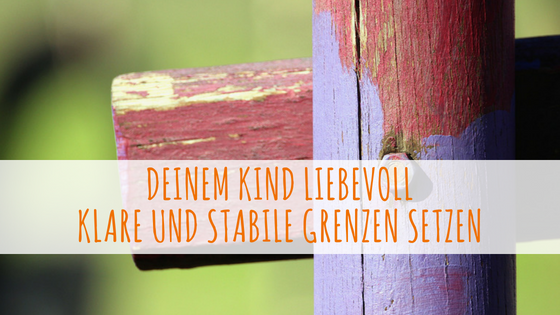Quite often the question, or rather belief or statement, becomes the subject of “limits”
- "My child is constantly testing his limits"
- "You have to stay consistent and not give in, otherwise I lost"
- "We have to clarify who is the boss here"
brought to me. This is exactly why I would like to comment on this view, these situations and the topic “testing limits” in more detail in this article.

1. What are the limits?
As you probably already know, there are different types of limits. On the one hand the general and on the other hand the personal limits. In short, they differ as follows:
General limits
These mostly appear in common everyday situations and often lead to the questions and statements mentioned above.
For example, if your child does something that you or your partner do not like at the moment, the common reaction to this is to say "You don’t do that", "You don’t do that" or "Stop it, you can’t do that".
But children are usually hard to deal with and they will probably not stick to it for long or appear to challenge you with something similar in the next situation. But does it really challenge you? To annoy you or to clarify power relationships?
Probably not, even if it may seem like this to you in this situation. Your child just wants to see YOU – you as an independent person – you with YOUR PERSONAL limits.
It notices very precisely if your answers or requests ("You don’t do that") are only advanced because it is easier. By doing so, you are pushing part of the responsibility a little bit away from you. And you don’t have to question or explain yourself (your actual motives).
Personal limits
Personal boundaries, on the other hand, are individual; they say something about you, about your values, your person, your motivations and your thoughts. And children can deal with and cooperate much better with this.
But in order to be able to show your personal limits to the outside world, you first have to be aware of them. Therefore, look and ask yourself what is ok for you, although it is not ok for others or society and also ask yourself what is too much for you personally and why (e.g. because it violates your values or your feelings).
Make that clear to yourself.
Even babies can make their personal limits wonderfully clear, e.g. by turn your head away when you are overwhelmed and need rest.
2. Then express or show your personal limits
Since your child wants to see YOU in these challenging situations, it is important that you also use a personal language if you make your limits clear.
For example, instead of "Stop now" or "Mommy wants you to stop", prefer to speak specifically of yourself; something like "I want you to give your sister 15 minutes more time and rest, because it is important to me that she can listen to me while reading aloud / can do her homework concentrated".
The latter statements are much clearer and your child knows what you want and why; it is easier for you to cooperate because you do not blame or do it wrong. It can understand and understand your no or your request better, because it is so clear why you want or say something and that it is important to you.
Of course, your child will not always accept your personal limits with joy, it can also get angry or frustrated. Maybe it stomps on the floor or says it doesn’t like you anymore or you are stupid. But that’s ok; it does not mean that it does not want to or will not stick to it, but only makes its feelings clear.
And this is exactly where many mums find themselves in a dilemma. Maybe you know that too. After all, the child should never be unhappy or sad. Of course, this is understandable and everyone wants their child to be happy and happy and not have bad experiences; and you probably don’t want to be a stupid mom either.
But that is not always possible, because all emotions, including the apparently negative ones, are part of the Life to. And the sooner your child learns how to use it correctly, by allowing them to show their negative feelings (see also the following article click), the better for the years to come.
So that means you can just stand it that your child doesn’t like you for a few hours, thinks it’s stupid or is angry. It may not always be that nice, but it is part of it.
3. How about your feelings??
You too can and should show your feelings, because
- you don’t have to be perfect, always safe or have the poker face ready
- your child likes to see that you are also not perfect
- your child can endure quite well if you have a bad day and are not in a good mood (which of course shouldn’t be the normal state – if it does, we can have a chat – clarity talk)
4. What is still important
Your child wants to get to know you with your personal limits and accept them, but for this to work, you first have to know your own personal limits and communicate them to the outside world (how often do you say yes even though you actually want to say no – read) also like here)?
The prerequisites so that you can implement this in your family life are:
- Find out what is important to you and why and derive your personal limits
- Also recognize and respect your child’s personal limits (and needs)
- So don’t just insist on compliance with your limits, but also allow them to your child (e.g. privacy in the case of adolescents or in general on the subject of "eating")
- Remember that you are the adult, i.e. You should support your child in recognizing their own personal limits and calling for them to be adhered to, especially towards third parties. For example, if your baby turns his head away, wants to stay with you because he no longer wants to be carried by aunt, uncle, acquaintances. Or if your child does not want to kiss the nice aunt or uncle; make sure that it can say that and that this is accepted (without emotional blackmail etc.)
5. Advantages if your personal limits are clear
If you succeed in knowing, expressing and respecting your personal limits, this will have a very positive effect on your family life:
- Then it is for your Child ok, if you sometimes say "no"
- It is much easier for your child to accept your no and stick to it (even if it doesn’t necessarily have a smile on its face)
- Penalties and consequences are then unnecessary
It is true that your child wants to cooperate with you as a parent, but at the same time it also wants to be recognized as an independent being. And it wants to see and experience you as a person with your personal limits and not as a grumbler with impersonal rules and limits that are simply put in front of him.
6. Summary and tips
So to be clear to yourself about what your personal limits are, take a close look at your values. Check for yourself what things you are demanding from your child because you have adopted them from the general public, but which are not so important to you personally.
Then write down your personal limits and maybe set up 2-3 particularly important family rules (together with your child and partner) that everyone should really stick to (e.g. no swear words, 15 minutes a day just for you, in the nobody disturbs you etc.)
You can confidently delete what is not important to you or it doesn’t matter. Because if you have made yourself aware of the unimportant, which is not suitable for you, then you do not have to insist that it is adhered to, so that unnecessary conflicts are unnecessary.
And please do not forget, with all the desire for harmony, that your child has to reach your personal limits:
- it has to question them in order to get to know themselves and become independent
- it has to rub against someone; and that it is above all at home is because it feels safe here
- it wants to recognize you and your personal limits and for this it must be able to meet them
- in the next step (whether w >Only then can it gradually recognize its own personal limits, pay attention to them and communicate them to the outside world. And that’s what we want most for our children, isn’t it??
Little digression to toddler no
The word "no" is very, very popular in toddler age and is a major challenge for many mothers and sometimes unsettles them. But this “no” is an important development step, your child recognizes himself as an independent person with an independent will. With its frequent "no", it draws your attention to the fact that it has its own will and that’s a good thing (although sometimes very exhausting).
But if you get involved in a power struggle here, then brings not at all – quite the opposite.
Next time (if you want to get your child to go to kindergarten, for example, but says "no"), just wait a bit and see what happens.
Because often your child only wants to be able to say "no" and see that you have heard and accepted it. If you report this back to him (that is, you see that he does not want to now / said no / etc.), You also tell him that you can understand this and then wait a few minutes, it is not uncommon that later on re-notice / request / try your child participates easily.
But only briefly on the side.
Let my thoughts on this topic go through your head and see what you can accept for yourself or what you want to implement.
and above all enjoy spending time with your child!
I would be happy to support you on your way to a relaxed family life and more serenity in dealing with your child. Find out more about my advisory services here, let’s talk to each other in clarity talks or subscribe to my newsletter!
PS:
Would you like more tips from me on how to bring up relaxed and relaxed, how to really enjoy being a mom AND how to recognize the needs of your child?
Here I support mums to shape their family life with ease and joy, to build a positive relationship with their child, to become more relaxed and to develop themselves personally.
write a comment Cancel replies
welcome
I am Steffi, triple mom, educational scientist, mamacoach and author.
On Emmali you can read about family and parenting issues, but also about traveling with children (or sometimes just as a couple), books and particularly helpful discoveries.
Take a look around, be inspired and have fun!
RELATED ITEMS
-

Why children need clear and stable boundaries, lovingly set boundaries for children
Limiting children is sometimes a real challenge. For children, borders are an essential building block for their personal growth….
-

Children, how time flies – how you prevent your life from running away
You have a lot to do as a mom. Sometimes so much that you think the work grows over your head. You have a lot to do as a mom. Sometimes so much,…
-

Setting two-year limits creates responsible adults – I’m a mother
Many parents see their two-year-olds as too small to set limits. However, it is important to start early so that you can…
-

If the child does not want to hear – parent compass – your magazine for pregnancy, baby – family
Parents usually educate their kids to a certain extent the way they raise themselves [. ] Usually parents raise their kids up to one…
